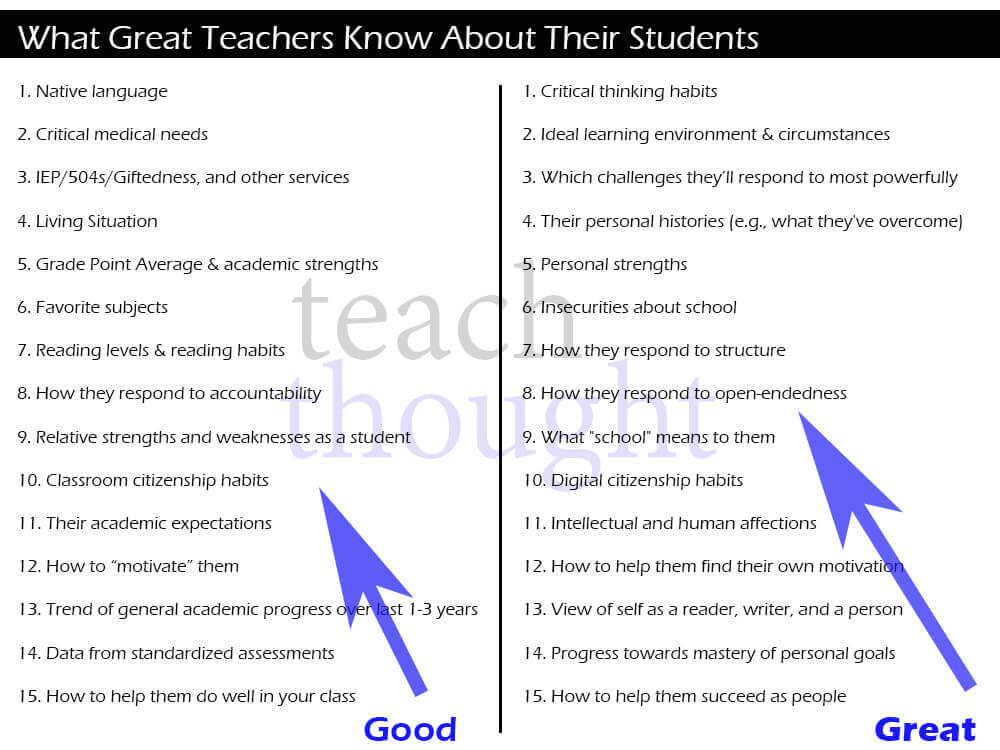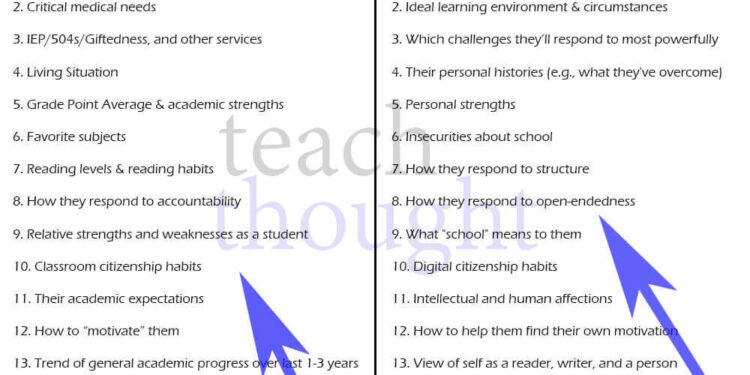

by TeachThought Staff
This is part 2 of our #iteachthought series (because we refuse to say “back to school”–well, except for just then). Part 1 looked at classroom design, specifically offering alternatives to rows of desks. Today, we’re going to help you create smarter, student-centered learning profiles.
If you’re creating a learning profile, what kind of information should be included? What’s the point of such a profile? How will it be used? Most learning profiles are quick glances of academic data. And there’s nothing wrong with this–it’s quick, useful, and basic.
But it’s also limited. To take another approach, as Grant Wiggins might suggest, let’s work backward. And further, let’s do so from a single big idea that unifies everything. Specifying a single idea that’s broad and accessible enough to be useful may be a challenge, but let’s try, starting with a few underlying assumptions.
1. Teachers plan learning experiences for students.
2. Different students have different needs. This implies a need for differentiation of instruction, personalization of curriculum, or both.
3. In this way, teachers are like designers. The data teachers use to make these kinds of design decisions varies.
4. An additional challenge? Teachers have a finite ability to process data, which implies a need to be selective with the data that is sought out and adjusted for.
5. At the classroom level, data is broadly considered in terms of content and performance.
6. Another way of thinking about this is to consider data quality–and not quality as it relates to accuracy or reliability, but rather what sort of information do I need about students to help them learn?
Though I disagree with what might be the fundamental premise that this post rests on–that teachers alone are responsible for the miracle of learning, and can even begin to know everything about every student–the idea here has to do with rethinking how we see students and how they relate to curriculum, and then designing both curriculum and learning models that fit these personalized learning needs.
What Good Teachers Know About Their Students
1. Native language
2. Critical medical needs
3. IEP/504s/Giftedness, and other services
4. Living Situation”, including religious beliefs, safety, food, family, access to books, technology, etc.
5. Grade Point Average & academic strengths
6. Favorite subjects
7. Reading levels & reading habits
8. How they respond to accountability
9. Relative strengths and weaknesses as a student
10. Classroom citizenship habits
11. Academic expectations (including difference between own goals and those of family)
12. How to ‘motivate’ them
13. Trend of general academic progress over last 1-3 years
14. Progress towards mastery of power standards/data from relevant standardized assessments
15. How to help them do well in your class
What Great Teachers Know About Their Students
1. Critical thinking habits
2. Ideal learning environment & circumstances
3. Which challenges they’ll respond to most powerfully
4. Their personal histories (e.g., what they’ve overcome)
5. Personal strengths
6. Insecurities about school
7. How they respond to structure
8. How they respond to open-endedness and uncertainty
9. What ‘school’ means to them
10. Digital citizenship habits
11. Intellectual and human affections
12. How to help them find their own motivation
13. View of self as a reader, writer, and a person
14. Progress towards mastery of personal goals (creative, professional, familial, or other) and how to help them set–and doggedly pursue–their own goals
15. How to help them create their own standards and metrics for ‘success’
*Age appropriate
Additional Reading
How-tos Of Differentiation Lesson Planning
Learning Profile Cards
Learning Profile (embedded above) by Jessica Winston
Creating Student-Centered Learning Profiles: What Great Teachers Know About Their Students


















